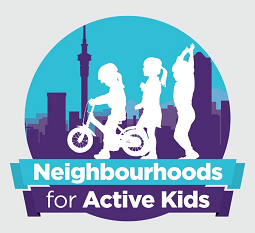 2017 snapshot of preliminary findings | 2015 key findings
2017 snapshot of preliminary findings | 2015 key findings
A team led by Associate Professor Melody Oliver is continuing the investigation of associations between built environment factors and children’s independent mobility, active travel and physical activity. Neighbourhoods for Active Kids (NfAK) involves up to 1500 primary and intermediate school children (Years 5-8) and their parents in 12 neighbourhoods across Auckland.
The team is using an internet based mapping survey (Soft GIS) to understand and assess neighbourhoods from children’s perspectives – where they go, how they get around, what they like and dislike, and how they experience their neighbourhoods. Food purchasing behaviours on the school trip and at school are also assessed. Height, weight and waist circumference are measured and accelerometers are worn over eight days calculate children’s levels of physical activity.
Parents are asked in computer-assisted telephone interviews about their children’s nutrition behaviours, electronic media use and other sedentary behaviours, their own neighbourhood perceptions and the mobility freedoms they allow their children.
Built environments have significant and enduring impacts on human health behaviours and outcomes, says lead researcher, Dr Melody Oliver: “Physical activity, active travel and independent mobility are all important contributors to children’s health and wellbeing. Ensuring environments support healthy behaviours in children is crucial for their current and future wellbeing.”
Objectives of NfAK include: determining associations between built environment factors and children’s body size (adjusting for nutritional behaviour and food environment covariates); investigating the mediating effects of parents’ safety perceptions on associations between built environment factors and children’s independent mobility and active travel; and assessing the effects of the transition from primary to intermediate school in terms of parenting practices, independent mobility, active travel and other physical activity.
Study protocols were piloted with a group of Year 5 students from Newmarket Primary School in Auckland, in November 2014. Findings informed the final protocols now being used in the full study. Data collection from children and their parents is due to be completed by the end of 2016.
The three year NfAK study is funded by the Health Research Council.
Contact researcher: Associate Professor Melody Oliver

